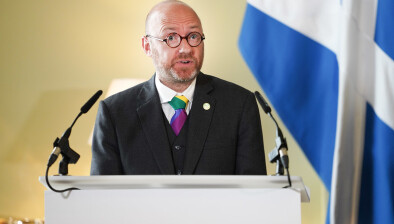Bute House Agreement collapse could mean ‘reset’ for housing policies

Former tenants' rights minister Patrick Harvie MSP
Housing and property organisations are bracing themselves for policy changes after the Scottish Government’s formal co-operation agreement with the Scottish Green Party was brought to an end yesterday.
First Minister Humza Yousaf formally informed Scottish Greens co-leaders Patrick Harvie and Lorna Slater of the end of the Bute House Agreement, and their tenure as ministers in his cabinet, with immediate effect.
The Scottish Government’s record on housing has been under intense scrutiny following a huge £196 million cut to the country’s affordable housing budget, whilst figures published last month pointed to the lowest number of homes started by housing associations last year than at any point since 1988.
This led the Scottish Federation of Housing Associations (SFHA) to state that the government target of delivering 110,000 homes by 2032 was “all but over” amid “absolute freefall” in the supply of new homes and record levels of homelessness.
Reacting to the end of the co-operation agreement between the SNP and the Greens, SFHA chief executive Sally Thomas said that the country’s housing emergency transcended party politics.
She said: “The turmoil we are seeing at Holyrood cannot distract from the real and present threat of Scotland’s housing emergency.
“Amid record homelessness and with 10,000 children living in temporary accommodation, the need for safe, warm, and affordable rented homes grows ever greater.
“The First Minister has said that the end of the Bute House Agreement represents a ‘new beginning’ for the Scottish Government, and we’d therefore call for an urgent reset on the huge cut to the affordable housing supply programme which is already faltering due to a lack of investment.
“Irrespective of which political parties are in government, Scotland is in desperate need of more social homes- this can only be delivered through sustained public investment.”
Rent controls
As minister for zero carbon buildings, active travel and tenants’ rights, Patrick Harvie had shared responsibility for housing and was inextricably connected to the proposed rent control measures in the recently published Housing Bill.
The First Minister has confirmed that in the short term his responsibilities will be covered by the cabinet secretary for social justice Shirley-Anne Somerville.
Members of the tenants’ union Living Rent are hoping the change will not water down those proposals while private landlord organisations have called for a more pragmatic approach.
John Blackwood, chief executive of the Scottish Association of Landlords, said: “Hopefully with these changes, we will see a more pragmatic and collaborative approach to housing policy that will allow for discussion and implementation of long-term measures that will end Scotland’s housing crisis.
“The Bute House Agreement has systematically damaged investor confidence in building new homes and has forced many landlords to sell up, with institutional investors openly saying they no longer see Scotland as an attractive place to invest. The Scottish Government must now act urgently to reverse their anti-landlord policies.
“We need a coordinated solution which encourages investment in social housing, council housing, the private rented sector and new owner-occupied homes.
“Only with that kind of coordinated partnership approach, can we make it affordable for landlords to continue to let out homes to rent, while increasing supply of all types of housing to make sure that everyone can have the home they deserve, at a cost they can afford.”
Timothy Douglas, head of policy and campaigns at Propertymark, said: “This must be taken as an opportunity to reset and rethink key housing policy at a time when rents are rising, there is uncertainty for agents and their landlords, local authorities are declaring housing emergencies and there is not enough property for people to rent across Scotland.
“Tax burdens on home buyers and those looking to purchase buy to let property must be reduced and any plans for minimum energy efficiency standards for homes must be realistic, achievable and provide funding incentives through grants and clear advice to help people improve their homes and property.
“The Cost of Living legislation that introduced rent caps has damaged investment in Scotland, reduced available property to rent and caused rents to rise. We urge the First Minister to take this opportunity to rethink future plans for rent control and introduce measures that increase the supply of homes across Scotland that will ultimately make renting and buying a home more affordable.”
David Alexander, the chief executive officer of DJ Alexander Scotland, added: “The departure of the Greens from the Scottish Government will hopefully allow for a reset of their policy on housing. The last couple of years have seen a toxic atmosphere with policies designed to negatively impact on the private rented sector, completely unrealistic targets for boiler replacement in homes, and an approach that was not inclusive, consultative, or constructive.
“I would hope that we can rebuild relations and restart discussions on the future of the housing sector and build a consensus which accurately reflects the needs of Scots now and in the future. We need more homes for buyers, and for tenants in the social and private rented sectors, and we need to ensure that everyone is engaged in providing sufficient homes in the coming years.”
Aditi Jehangir, chair of Living Rent, said: “The end of the Bute House Agreement can not be allowed to water down the Housing Bill.
“Rent controls and better protections for tenants are a vital piece of legislation to deliver the vision for Scotland that Humza Yousaf has promised and will go a long way in supporting Scotland’s tenants.
“In the middle of the worst housing crisis in generations, we desperately rent controls that bring down rents, improve quality and are tied to the property, not the tenancy.”
Property investment
The Scottish property industry has called on the government to refocus on the economy and new housing investment.
Innes Smith, chief executive of Springfield Properties, said: “We are very hopeful that this gives the SNP the opportunity to reconnect with businesses and implement policies that get us to net zero while encouraging lost housing investment back into Scotland and enabling the delivery of the quality homes across multiple tenures that are so desperately needed.”
Scottish Property Federation chair Maria Francké added: “We agree with the First Minister that the ending of the Bute House Agreement offers the Scottish Government an opportunity to refocus its priorities. Today we call on the Government to reprioritise Scotland’s economy and promote investment into the infrastructure that Scotland needs to make it the best place to live and work.
“Scotland is in the grips of a housing crisis with a low or no-growth economy, and increasing the supply of homes of all tenures to buy and rent is the only long-term answer to this challenge. To help achieve this goal, we urge the First Minister to work with those seeking to build more, high-quality Build-to-Rent homes in Scotland to address the negative impact that the government’s current rent control proposals are having on investment.
“The clear message we heard from the Scottish real estate industry at our conference just yesterday in Glasgow was that the market needs clarity and a pragmatic policy framework on rent controls. Unless we see the current rent controls proposals amended, we are in danger of Scotland losing up to £3bn of build to rent led investment. The Scottish Government needs to realise that this would be an enormous, missed opportunity both for the Scottish economy and its communities.”
Climate emergency
Prior to yesterday’s announcement, the Scottish Government had already confirmed it was dropping its climate change target of reducing greenhouse gas emissions by 75% by 2030.
WWF Scotland director Lang Banks said: “Despite this news, one thing remains the same – the Scottish Government must urgently continue to take steps to address the climate and nature emergency. There is overwhelming public support in Scotland for action that will create jobs and deliver warmer homes, cleaner air, and support more farmers to adopt climate and nature-friendly practices.
“Specifically, we need to see action to ensure the proposed Heat in Buildings and Natural Environment Bills are delivered.
“We will continue to work with all the political parties to ensure Scotland does everything it can to seize the benefits for both people and planet that will come from rapid and sustained delivery of action to address climate change and nature loss.”








